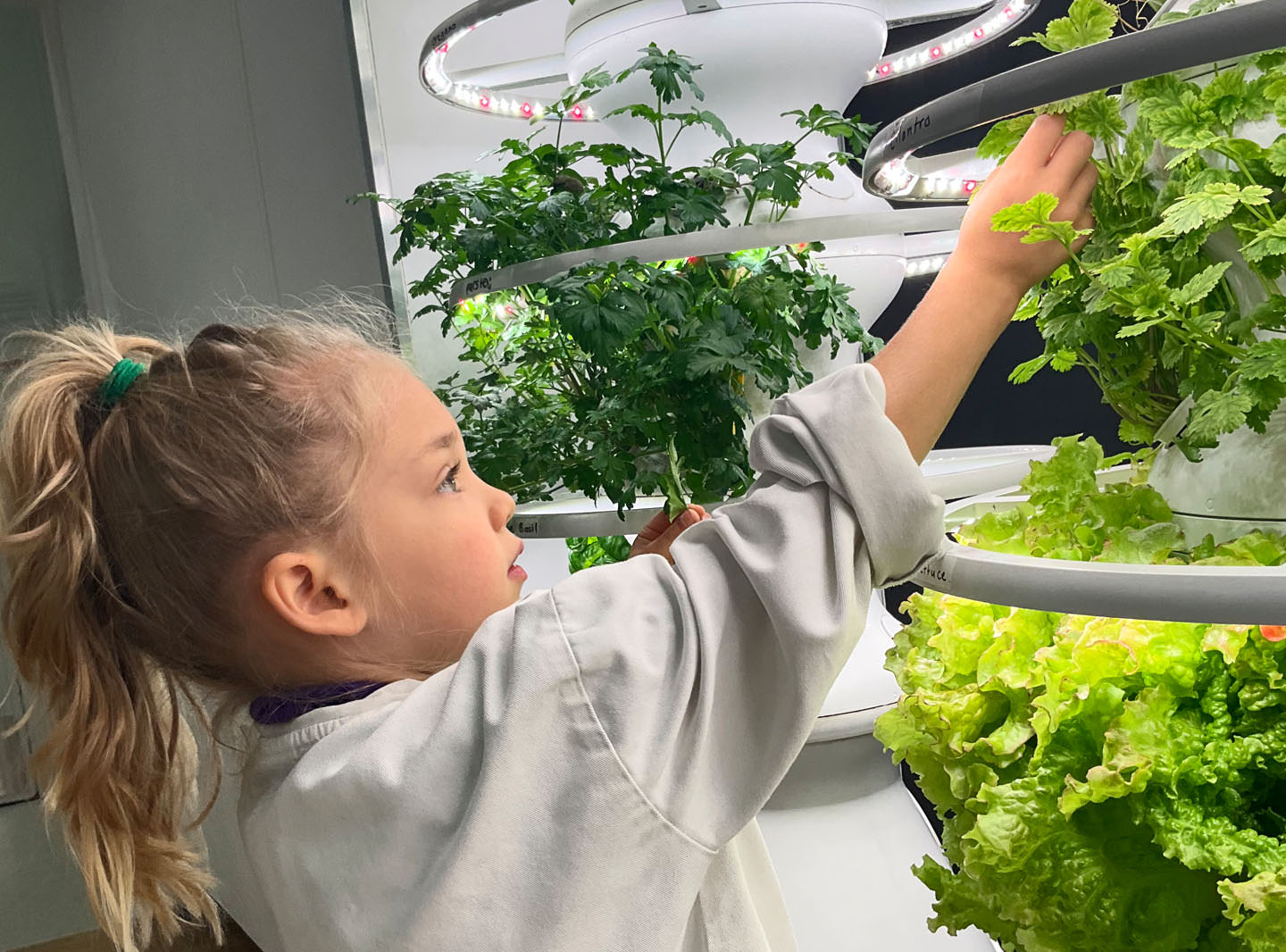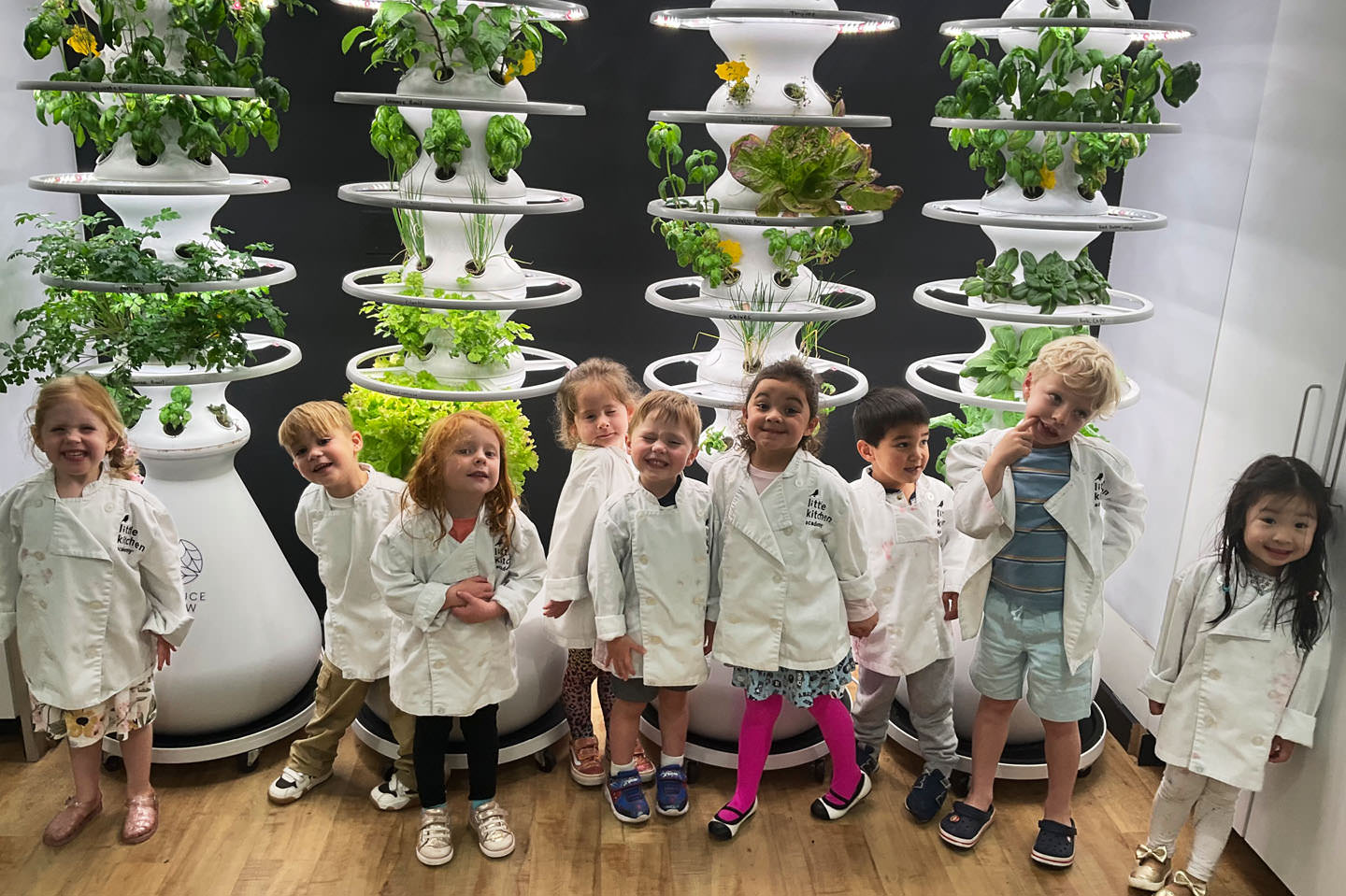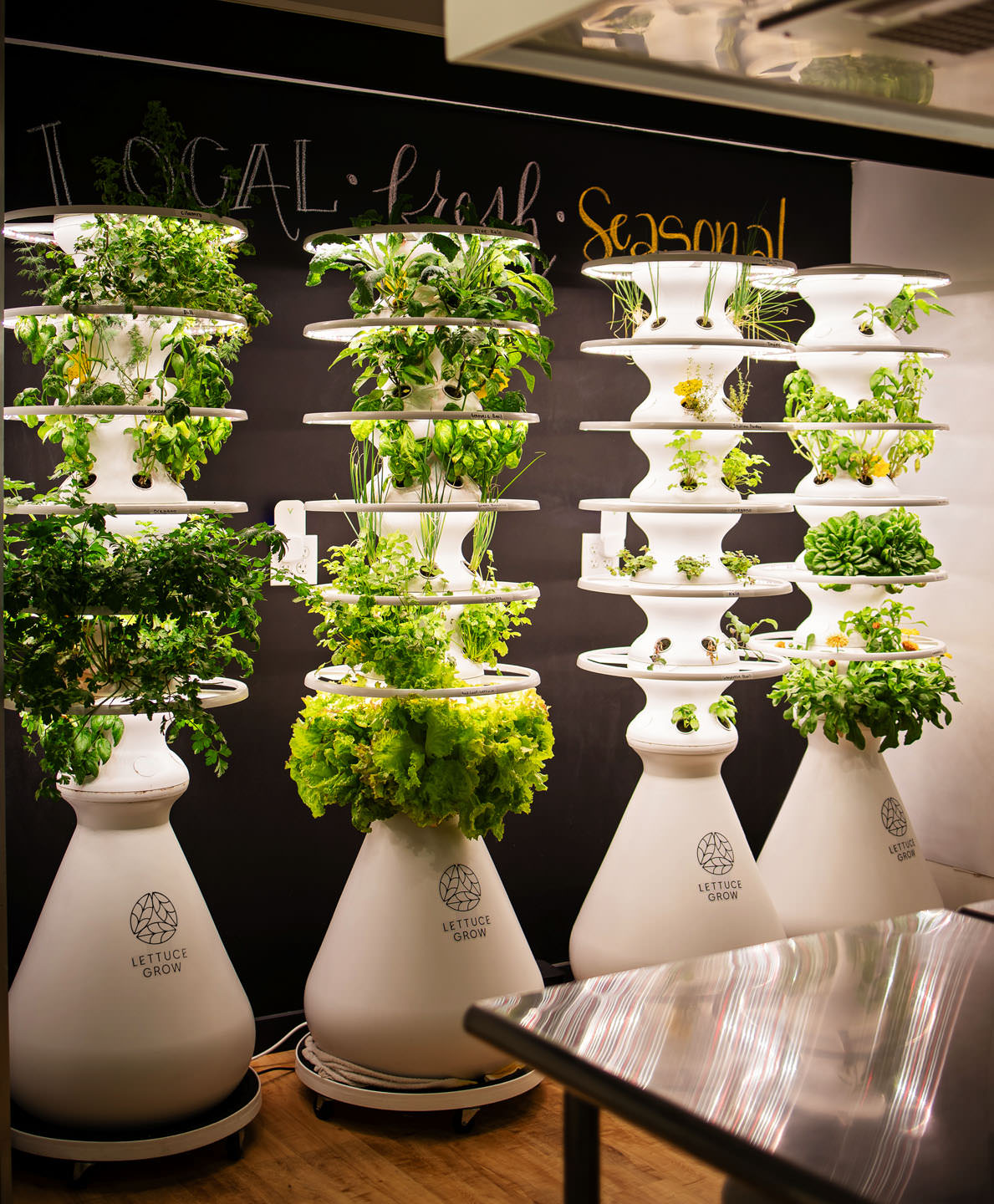The table at Little Kitchen Academy in West Point Grey is entirely silent except for a slow crescendo of metallic clattering as 10 small pairs of hands, each cuffed by a crisp white chef’s jacket, work flour sifters over 10 identical mixing bowls. The chalkboard on the wall shows that today’s recipe is for crumble pear muffins, and, flour sifted, the students rush to the back of the room to receive baking powder (a quarter teaspoon) in a ramekin. Everything at the academy feels like a miniature replica of a professional kitchen, from the stainless steel countertops to the glass-front produce refrigerator. But behind the queue of eight-year-old chefs, the mere modernity of the kitchen gives way to something plucked from science fiction.
Four large white bulbs attenuate up from the floor into an undulating column five feet high, ringed by floating circular lights that spread a soft spaceship glow over the classroom. Each bulge sprouts greenery—tumbling stems of spearmint, clusters of coriander and lettuce, soft hummocks of basil, feathery garlic chives, and pert cherry tomatoes. These herbs and vegetables will be incorporated into cooking when they are only a little larger. The seedlings, each in a small ball of soil, were planted a few weeks ago but are already filling out the back wall with foliage.
These growing shoots spring from a collaboration between two families, whose chance meeting in Los Angeles led to an experiment in hands-on culinary education that has now reached Vancouver, Toronto, and cities across North America.
The first family are the Curins—Brian and Felicity—a Vancouver businessman and a chef who together, in 2018, launched a Montessori academy to teach cooking skills to children. Brian grew up working on a dairy farm near Lake Geneva, Wisconsin, picking rocks, husking corn, tending pigs, and learning to drive a tractor and a combine. Though he went on to a 20-year career in marketing, the importance of growing things never left him. Felicity, who Brian calls the “visionary” of the two, is a chef and restaurateur—responsible for opening the first branch of Canadian casual dining chain Earls in the United States—who went back to school to train in Montessori education. Together they imagined Little Kitchen Academy, a classroom where children could develop a holistic, personal relationship with food, learning confidence and life skills along the way. All that was missing was a way to bring that food—in its fresh, growing, vital form—into the classroom.

They started with dirt—growing vegetable beds at the academy. The result was, as anyone who has ever started a vegetable garden of their own knows, predictably messy. “We were full-time gardeners in our own business,” Brian says. “It was not a scalable option for us.” They needed something higher tech.
That’s when Jacob and Zooey walked by the Curins’ location in Century City, Los Angeles, just off Santa Monica Boulevard and Avenue of the Stars. Jacob Pechenik, a financier and film producer, had also fallen in love with agriculture, founding his own farm near Austin, Texas, which supplies vegetables to high-end restaurants and grocery stores. His wife, actress Zooey Deschanel, had her own complicated relationship with food—a long-time vegan (now pescetarian) with multiple allergies, compounded by the struggle to eat healthily while pregnant. Pechenik and Deschanel have since separated, but they remain collaborators, both in raising their two children and in their company Lettuce Grow—an attempt to bring sleek, convenient, hypermodern hydroponic units into people’s homes.
“For a lot of these children, this is the first time they’ve ever actually had a fresh, off-the-vine tomato.” —Brian Curin
For Pechenik, the motivation for the company came from seeing how distant consumers are from the source of their food, even at his lovingly tended organic farm. “We were taking our organic produce and putting it in plastic, and putting that in a box, and putting that on a truck, and taking it to the distribution centre, and it would get loaded onto another truck, and take this long journey to the store. It would be, like, seven days later when anyone got to enjoy it,” he says. “And not the same product, not having the same flavour. Not having the same texture or nutrient density. And there was so much waste along the way.”
He wanted other people to have the same experience he did, he says, eating fresh food from a living plant. It was the same experience the Curins were looking to share with their students.
The alchemy, Brian Curin says, was obvious: “It was one meeting.” Lettuce Grow’s hydroponic gardens, which the company calls “farmstands,” would become a centrepiece of Little Kitchen Academies, bringing fresh produce directly to students’ cutting boards.
Both men say that the most beautiful result of their collaboration has been watching how children—famously reluctant to eat their greens—respond differently to food they have grown themselves. Brian describes watching a father of a student at the Point Grey location in tears, leaning his head against the window and watching his nine-year-old daughter in class. “Is everything okay?” Felicity asked. “I’ve never seen my daughter eat a carrot before,” the father replied.
“People sometimes think it’s magic, and it’s not,” Brian says. “For a lot of these children, this is the first time they’ve ever actually had a fresh, off-the-vine tomato.”

Pechenik says he sees the same thing with his own children. At home, he grows hydroponic greens and cherry tomatoes near the couch. “They kept running to it, pulling the cherry tomatoes off, taking a bite of it, and giving me the other half. They do this over and over and over again. They actually had their own interaction with it.” He says he’s seen his daughter, watching television, casually pull the leaf off a bok choy and eat it raw.
Pechenik believes hydroponics are an important part of the food system of the future. The convenience, mobility, and versatility of hydroponic units move fresh food closer to where people live, and recent developments in LED lighting have made indoor farming more cost effective and environmentally sustainable. But ultimately, he’s realistic that hydroponics will only ever make up a small part of even the most enthusiastic grower’s diet. In the end, it’s not just about changing what we eat but also how we think about what we’re eating.
“Many people feel disempowered from having an opinion about food because we feel so disconnected. Our great-grandparents used to grow, and now we’re so removed that we don’t feel qualified to ask the questions. When people start to grow, they think, ‘We can do this.’ And they start to wonder about things,” he says. “I think growing is the gateway towards living a more conscious life.”
Brian Curin feels the same way about his academy. Most of his students, he acknowledges, won’t go on to become chefs or restaurateurs, but, he hopes, the intuition they develop for food will serve them whatever they do.
“It’s never about the actual food or what they’re making. It’s about all the skills they build that are preparing them for the rest of life. It’s a survival skill,” he says. “These kids come in, and they think, ‘Everything I made is fantastic, because I made it the way I wanted to.’”
Read more from our Autumn 2024 issue.








